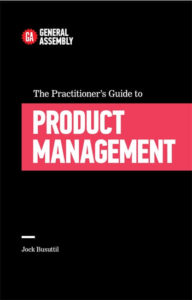
PRODUCTHEAD: The new lamplighters
PRODUCTHEAD is a regular newsletter of product management goodness,
curated by Jock Busuttil.
exit music (for a product manager)
tl;dr
Amazon warehouses are gradually moving towards full robotic automation
Greater automation creates new types of work, but not necessarily for people
Smart contracts are already automating financial transactions, but can be susceptible to coding flaws
Increased use of machine learning in insurance places greater burden on regulators to ensure fairness
hello
Robotics, artificial intelligence, machine learning, automation. These concepts can trigger profoundly different reactions in people depending on their context.
For some, they reflect a positive future — technologies that help them to perform mundane tasks more efficiently, freeing them to focus on higher order work.
For others, they portend a bleaker future, in which their job, their source of income, even their sense of societal worth is usurped by technology.
The lamplighter is often the metaphor used for new technology making human workers redundant — in this case, electric street lamps. It is perhaps ironic to note that lamplighters themselves were a new job created as a result of technological evolution.
In the late 1700s and early 1800s, the few city street lamps that existed were fuelled by expensive whale oil. When gas extracted from coal became available as a cheaper alternative fuel, more widespread street lighting became economical. And so lamplighters were now needed to light the lamps each night.
As electricity began to displace gas in street lamps in the early 1900s, the lamplighters gradually became redundant, their jobs a victim of automation.
When I was working for the UK’s Ministry of Justice, a frequent concern voiced was that the digitisation of public services would gradually remove the need for civil servants to perform increasingly redundant tasks such as paper form processing. The fear was that, with more automation, there wouldn’t be enough work to go around and people would lose their jobs.
This is an example of economist David Schloss’s Lump of Labour Fallacy. The mistake being made is to assume that there is a fixed, finite amount of work to be divided up, and that automation leaves less work for people to do. Instead, automation helps to change the nature of the work to be done, creates new tasks and increases the amount of the work available.
We are all the new lamplighters. The nature of our work continues to change and evolve, and as sure as some job roles will become defunct, so also will new job roles come into existence that defy prediction.
In 1999, as we sat worrying about whether the Y2K bug would cause the modern world to crash, do you think anybody was forecasting how lucrative it would be to move into growth hacking or social media influencing?
So this week I’ve pulled together some thought-provoking content on the way technology is continuing to transform whole industries, and the implications of that constant evolution.
Speak to you soon,
Jock
what to think about this week
How robots are transforming Amazon warehouse jobs — for better and worse
Amazon is leading a robotics race that will have a seismic impact on the warehouse industry, which employs more than 1.1 million Americans today.
Are we becoming cogs in an increasingly robotic machine?
[JASON DEL REY / VOX]
3 myths about the future of work (and why they’re not true)
“Will machines replace humans?” This question is on the mind of anyone with a job to lose. Daniel Susskind confronts this question and three misconceptions we have about our automated future, suggesting we ask something else: How will we distribute wealth in a world when there will be less — or even no — work?
How to ensure we all get a share of the pie
[DANIEL SUSSKIND / TED]
Product Management Coaching
Whether you’re new to product management or have been a product manager for years, a coaching session can help you to step up your career.
We’ve coached people wanting to get into product management, product people with nobody in their organisation to manage them, and experienced product managers preparing to apply for a promotion.
We can help you prepare for your product manager interview, including mock interviews.
A proportion of the fees from every coaching session is donated to charity. Just reply to this email if you’re interested in finding out more.
Smart contracts – can code ever be law?
We live in an age of disruption – and the legal industry is not immune. “Smart contracts” has been receiving particular attention, with its potential to bring about both efficiencies in legal work… and also new kinds of legal challenges.
Will lawyers need to learn to code?
[ASHURST]
Algorithms and AI are radically changing insurance
The growing use of artificial intelligence to price insurance could erode basic legal protections built into the law to protect both individuals and the insurance market. To prevent discrimination and ensure fairness, regulators must begin to develop new capacities and tools.
When your smart toothbrush rats you out to your dental insurer
[RICK SWEDLOFF / PROMARKET]
recent posts
What technical skills do I need to be a product manager?
I am searching for a career change and Product Management/ Project Management are my areas of interest. I was looking to understand, based on your experience, if in such roles technical skills are required?
[I MANAGE PRODUCTS]
How to start a new product manager job
Starting a new product manager job can be daunting, particularly if you don’t change jobs very often. I work freelance, so I find myself in a new organisation roughly every 3-6 months. Let me share with you my tips for your first few months in a new role.
What to do in the first 30-90 days
[I MANAGE PRODUCTS]
The product leader’s guide to interviewing
Because I tend to help organisations build up their product team from scratch, I’m often involved in the interviewing and hiring process, so I’d like to share with you my product leader’s guide to interviewing product managers.
Countering unconscious bias in recruiting
[I MANAGE PRODUCTS]
upcoming talks and events
25th March 2021, 15:30 GMT
The Firestarters
Will Elon’s predictions come true? (discussion)
The Firestarters is a virtual festival of conversation in support of Rethink Mental Illness and UK Youth.
500+ experts hosting interactive discussions on wellbeing, fitness, music, entertainment, lifestyle, culture, entrepreneurship and innovation.
Get access via the URfeed app
5th May 2021, 16:00 GMT
Threads
Online product management round table discussion (topic TBC)
Tickets
can we help you?
Product People is a product management services company. We can help you through consultancy, training and coaching. Just contact us if you need our help!
Helping people build better products, more successfully, since 2012.
PRODUCTHEAD is a newsletter for product people of all varieties, and is lovingly crafted from stockpiled toilet paper.


Leave a Reply